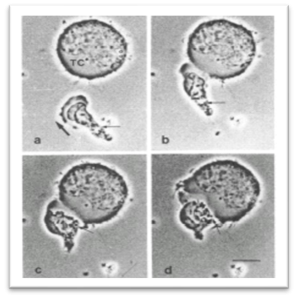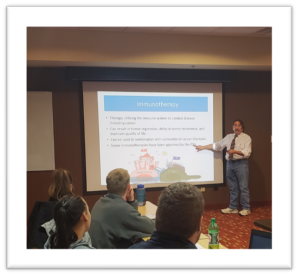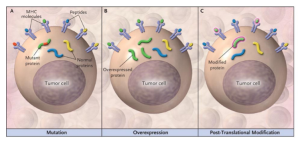K9-ACV is a customized cancer vaccine for pets. Its background development has connections from the world-renowned National Cancer Institute to a quiet university coffee shop. Along the way dedication and the desire to improve the lives of pets and people continue to drive its development.

(Figure 1)
Dr. John Yannelli is the co-inventor of K9-ACV, a cancer vaccine for dogs. Dr. Yannelli has been involved in Immunotherapy Cancer research since 1985 and is a well-renowned cancer researcher. During his post-doc at the Medical College of Virginia, Dr. Yannelli first captured the holy grail of cancer immunotherapy or the “kiss of death”, a cytotoxic T-Lymphocyte delivering a lethal hit to a cancer cell utilizing high-resolution cinemicrography[1] (figure 1). This type of immune surveillance and response fuels the development of cancer drugs.
From 1991-1995 Dr. Yannelli served as Head of Cellular Immunotherapy at the Surgery Branch of the National Cancer Institute working alongside Dr. Steven Rosenberg. In 1995 Dr. Yannelli was recruited to the University of Kentucky College of Medicine to develop approaches to treat Non-Small Cell Lung Cancer (NSCLC) in patients. Dr. Yannelli and colleagues treated human patients with an immunotherapy vaccine that included some of the same key elements utilized in Ardent’s cancer vaccine for dogs and this work would form the basis for K9-ACV. Dr. Yannelli’s human clinical paper was published in the Journal of Clinical Oncology and Lung Cancer in 2004[2]. Throughout his research career at UK Dr. Yannelli maintained his role as an academic professor shaping future scientists and clinicians and winning multiple awards for his teaching on Tumor Immunology and Immunology (Figure 2, Dr. John Yannelli).

(Figure 2)
In 2016 Dr. Yannelli and a colleague Dr. Donald Cohen an Immunologist and Director of the UK Core Flow Cytometry Department teamed up to develop K9-ACV, a customized cancer vaccine for dogs. The idea was first drafted on paper at a University of Kentucky campus coffee shop where the two would meet from time to time to discuss their research. Dr. Yannelli was stricken with curiosity from a recent visit to his veterinarian’s office. The veterinarian had just removed a large mass and intended to only send a portion out for pathology. This left a large sample of likely tumor cells that could be studied through funded pre-clinical research and with family consent. Materials like these in human patients were not always readily available. As a pet lover, this sparked the idea that Dr. Yannelli’s experience in human cancer research could be translated to help pets.
Drs. Yannelli and Cohen connected with Ardent and a partnership was developed to fund pre-clinical research at Ardent. This research led to the process by which Ardent isolates canine tumor cells from tumor samples. Any molecule capable of being recognized by the immune system is considered an antigen. K9-ACV utilizes Tumor Associated and Neo-antigens from the tumor cells found within the tumor materials delivered to its laboratory[3] . Today some of the same methodologies to generate the first ingredient of K9-ACV, apoptotic bodies from tumor cells, are utilized to improve the lives of dogs stricken with cancer.

(Figure 3)
To date, K9-ACV has been evaluated for safety in over 1,000 solid tumor-bearing dogs and is moving through clinical trials. K9-ACV is only possible through the work of researchers like Dr. John Yannelli and Dr. Don Cohen, and the human-animal bond they shared with their own pet families to devote their research to improving the lives of pets. Ardent is grateful for the scientific breakthroughs from Dr. Yannelli and his colleagues to bring needed cancer treatments to pets.
Click here to learn more about K9-ACV.
[1] Reorientation and fusion of cytotoxic T lymphocyte granules after interaction with target cells as determined by high-resolution cinemicrography. J R Yannelli, J A Sullivan, G L Mandell, and V H Engelhard J Immunol January 1, 1986, 136 (2) 377-382;
[2] Hirschowitz EA, Foody T, Kryscio R, Dickson L, Sturgill J, Yannelli J. Autologous dendritic cell vaccines for non-small-cell lung cancer. J Clin Oncol. 2004 Jul 15;22(14):2808-15. doi: 10.1200/JCO.2004.01.074. PMID: 15254048.

Recent Comments